MRKT20052: Marketing Management Reflective Analysis Report
VerifiedAdded on 2022/09/22
|7
|1729
|17
Report
AI Summary
This report presents a reflective analysis of two articles related to marketing management and digital communications. The first article explores recent marketing trends, including general marketing, content marketing, social-media marketing, SEO, technology, and privacy trends, emphasizing their importance for modern companies. The analysis highlights the implications of these trends for marketing managers and stakeholders, including consumers. The second article examines consumer buying behaviors for sustainable products, discussing the challenges and opportunities for companies in this area. It analyzes the importance of corporate social responsibility and sustainable development goals. The report emphasizes that companies should continue producing sustainable products and not stop despite consumer behavior. The analysis provides insights into the impact of these issues on various stakeholders, including businesses, consumers, and investors. The student learned about ephemeral social-media marketing, search engine optimization, technology used for marketing and privacy trends concepts from the analysis.
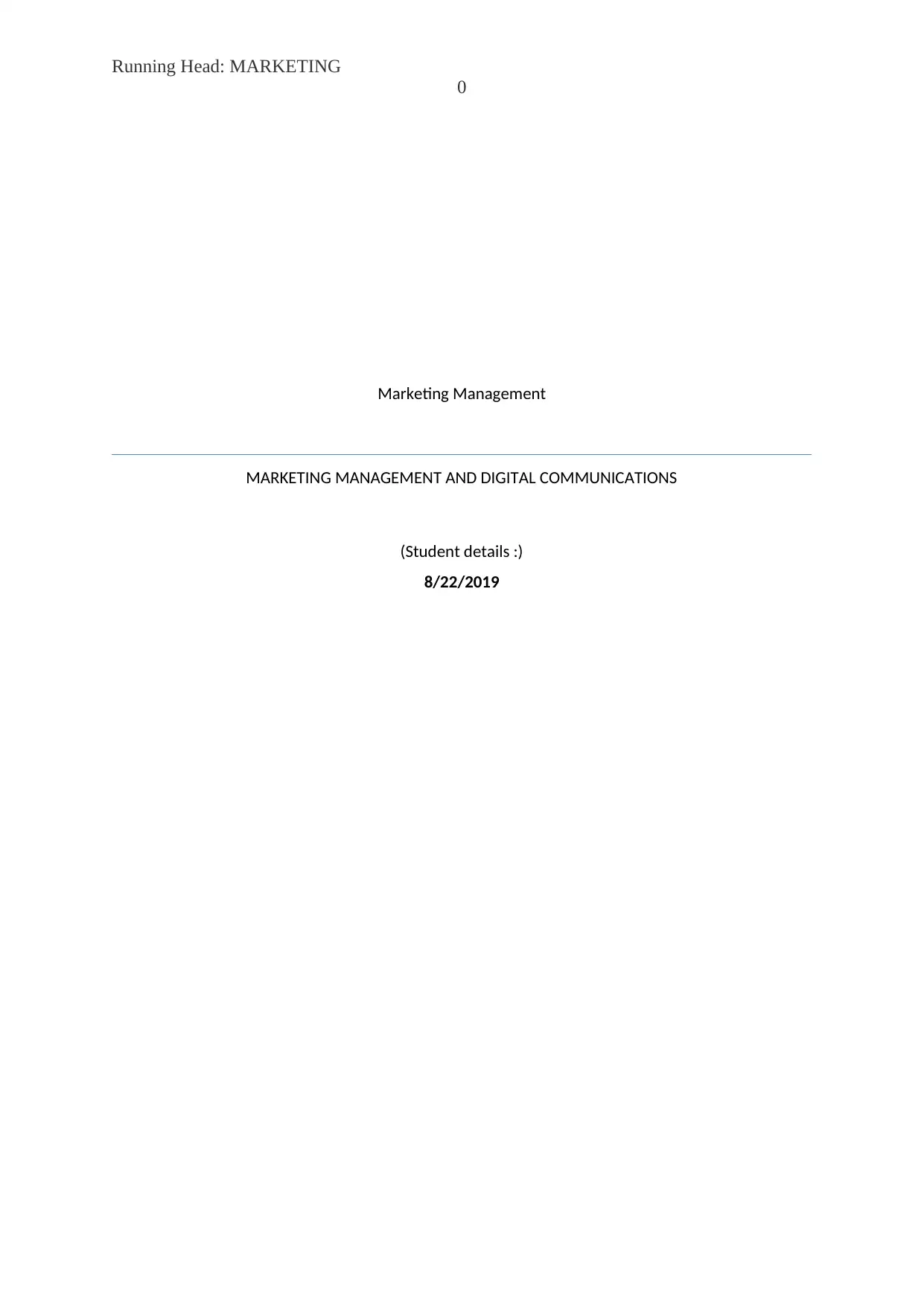
Running Head: MARKETING
0
Marketing Management
MARKETING MANAGEMENT AND DIGITAL COMMUNICATIONS
(Student details :)
8/22/2019
0
Marketing Management
MARKETING MANAGEMENT AND DIGITAL COMMUNICATIONS
(Student details :)
8/22/2019
Paraphrase This Document
Need a fresh take? Get an instant paraphrase of this document with our AI Paraphraser
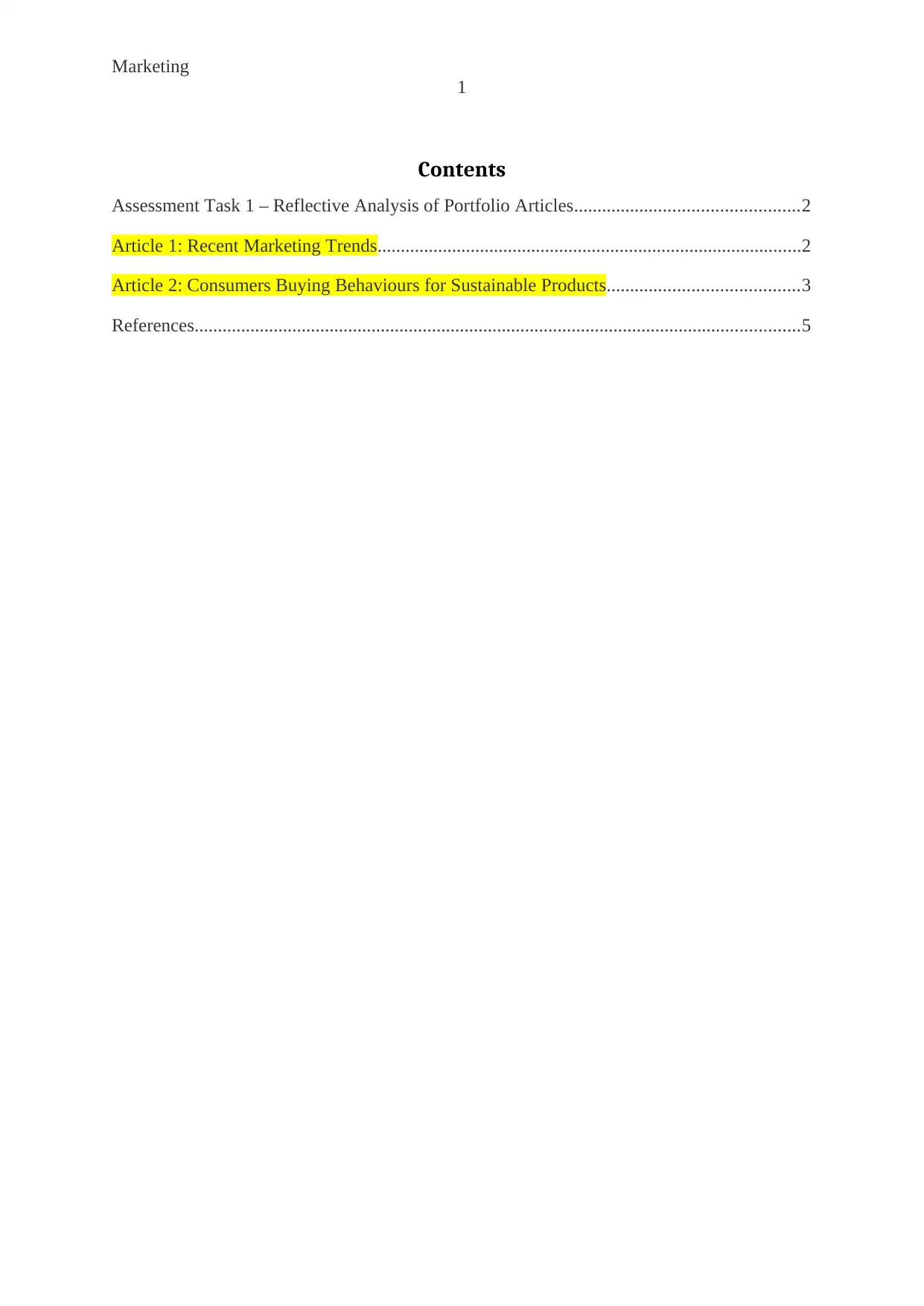
Marketing
1
Contents
Assessment Task 1 – Reflective Analysis of Portfolio Articles................................................2
Article 1: Recent Marketing Trends...........................................................................................2
Article 2: Consumers Buying Behaviours for Sustainable Products.........................................3
References..................................................................................................................................5
1
Contents
Assessment Task 1 – Reflective Analysis of Portfolio Articles................................................2
Article 1: Recent Marketing Trends...........................................................................................2
Article 2: Consumers Buying Behaviours for Sustainable Products.........................................3
References..................................................................................................................................5
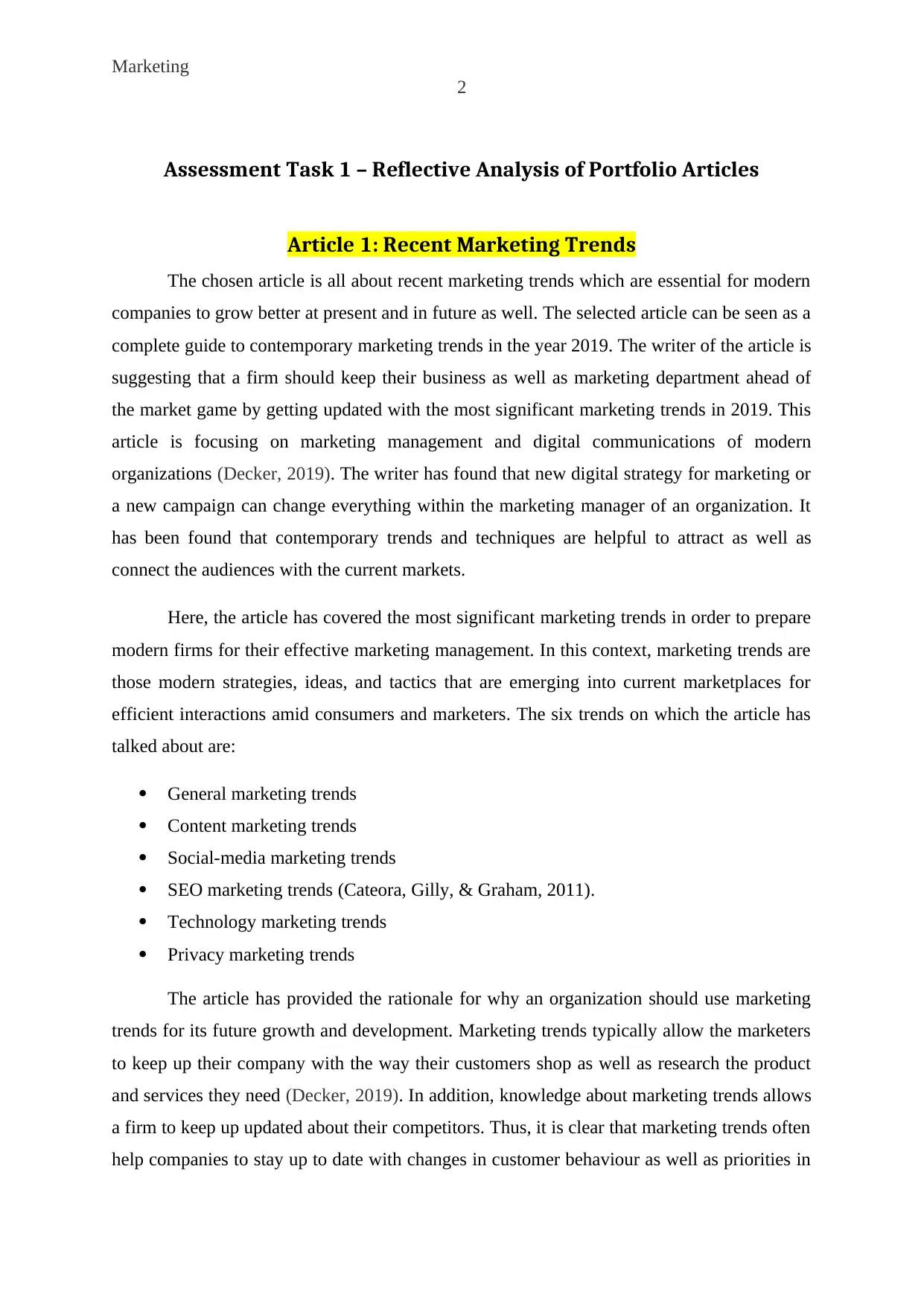
Marketing
2
Assessment Task 1 – Reflective Analysis of Portfolio Articles
Article 1: Recent Marketing Trends
The chosen article is all about recent marketing trends which are essential for modern
companies to grow better at present and in future as well. The selected article can be seen as a
complete guide to contemporary marketing trends in the year 2019. The writer of the article is
suggesting that a firm should keep their business as well as marketing department ahead of
the market game by getting updated with the most significant marketing trends in 2019. This
article is focusing on marketing management and digital communications of modern
organizations (Decker, 2019). The writer has found that new digital strategy for marketing or
a new campaign can change everything within the marketing manager of an organization. It
has been found that contemporary trends and techniques are helpful to attract as well as
connect the audiences with the current markets.
Here, the article has covered the most significant marketing trends in order to prepare
modern firms for their effective marketing management. In this context, marketing trends are
those modern strategies, ideas, and tactics that are emerging into current marketplaces for
efficient interactions amid consumers and marketers. The six trends on which the article has
talked about are:
General marketing trends
Content marketing trends
Social-media marketing trends
SEO marketing trends (Cateora, Gilly, & Graham, 2011).
Technology marketing trends
Privacy marketing trends
The article has provided the rationale for why an organization should use marketing
trends for its future growth and development. Marketing trends typically allow the marketers
to keep up their company with the way their customers shop as well as research the product
and services they need (Decker, 2019). In addition, knowledge about marketing trends allows
a firm to keep up updated about their competitors. Thus, it is clear that marketing trends often
help companies to stay up to date with changes in customer behaviour as well as priorities in
2
Assessment Task 1 – Reflective Analysis of Portfolio Articles
Article 1: Recent Marketing Trends
The chosen article is all about recent marketing trends which are essential for modern
companies to grow better at present and in future as well. The selected article can be seen as a
complete guide to contemporary marketing trends in the year 2019. The writer of the article is
suggesting that a firm should keep their business as well as marketing department ahead of
the market game by getting updated with the most significant marketing trends in 2019. This
article is focusing on marketing management and digital communications of modern
organizations (Decker, 2019). The writer has found that new digital strategy for marketing or
a new campaign can change everything within the marketing manager of an organization. It
has been found that contemporary trends and techniques are helpful to attract as well as
connect the audiences with the current markets.
Here, the article has covered the most significant marketing trends in order to prepare
modern firms for their effective marketing management. In this context, marketing trends are
those modern strategies, ideas, and tactics that are emerging into current marketplaces for
efficient interactions amid consumers and marketers. The six trends on which the article has
talked about are:
General marketing trends
Content marketing trends
Social-media marketing trends
SEO marketing trends (Cateora, Gilly, & Graham, 2011).
Technology marketing trends
Privacy marketing trends
The article has provided the rationale for why an organization should use marketing
trends for its future growth and development. Marketing trends typically allow the marketers
to keep up their company with the way their customers shop as well as research the product
and services they need (Decker, 2019). In addition, knowledge about marketing trends allows
a firm to keep up updated about their competitors. Thus, it is clear that marketing trends often
help companies to stay up to date with changes in customer behaviour as well as priorities in
⊘ This is a preview!⊘
Do you want full access?
Subscribe today to unlock all pages.

Trusted by 1+ million students worldwide
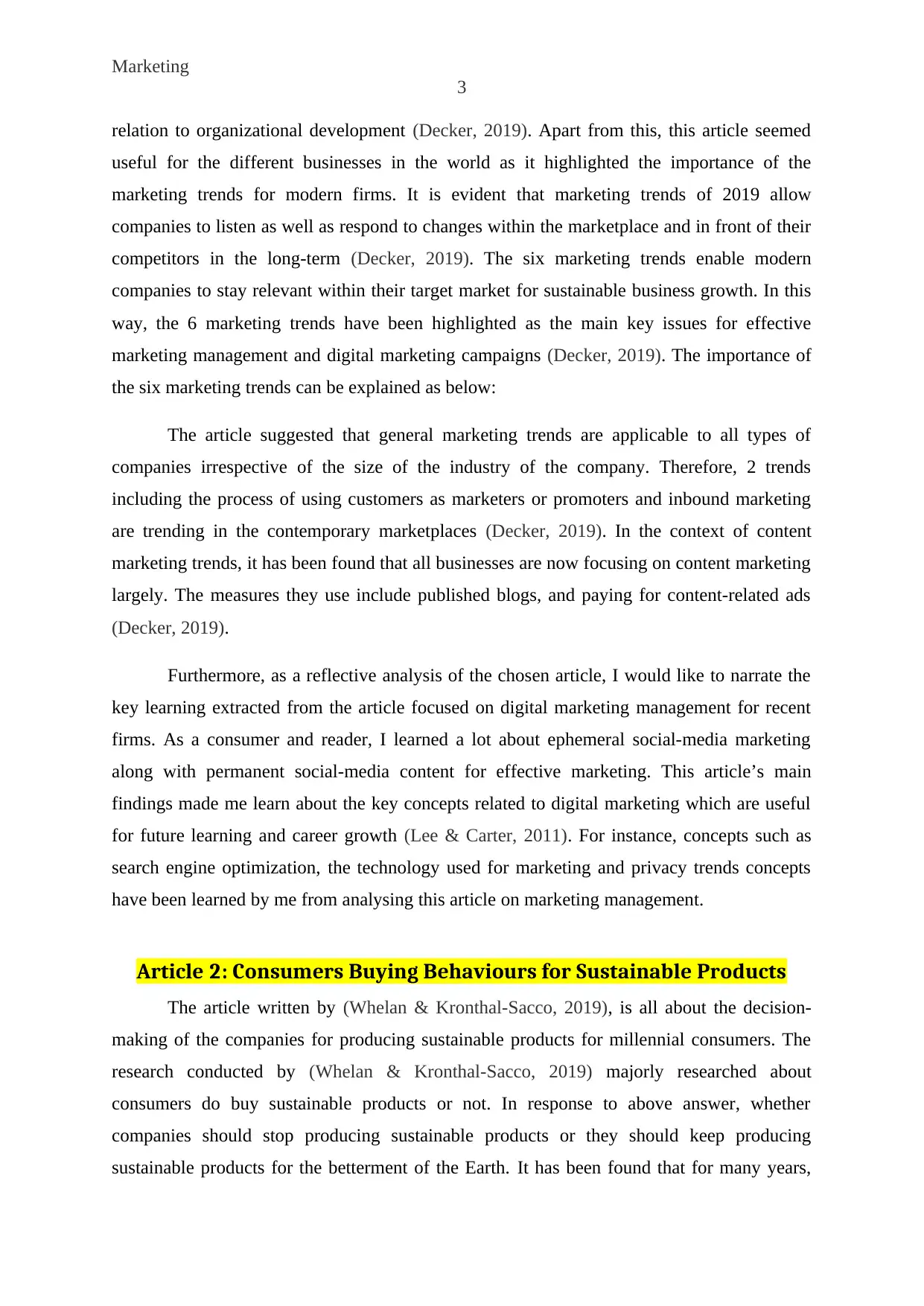
Marketing
3
relation to organizational development (Decker, 2019). Apart from this, this article seemed
useful for the different businesses in the world as it highlighted the importance of the
marketing trends for modern firms. It is evident that marketing trends of 2019 allow
companies to listen as well as respond to changes within the marketplace and in front of their
competitors in the long-term (Decker, 2019). The six marketing trends enable modern
companies to stay relevant within their target market for sustainable business growth. In this
way, the 6 marketing trends have been highlighted as the main key issues for effective
marketing management and digital marketing campaigns (Decker, 2019). The importance of
the six marketing trends can be explained as below:
The article suggested that general marketing trends are applicable to all types of
companies irrespective of the size of the industry of the company. Therefore, 2 trends
including the process of using customers as marketers or promoters and inbound marketing
are trending in the contemporary marketplaces (Decker, 2019). In the context of content
marketing trends, it has been found that all businesses are now focusing on content marketing
largely. The measures they use include published blogs, and paying for content-related ads
(Decker, 2019).
Furthermore, as a reflective analysis of the chosen article, I would like to narrate the
key learning extracted from the article focused on digital marketing management for recent
firms. As a consumer and reader, I learned a lot about ephemeral social-media marketing
along with permanent social-media content for effective marketing. This article’s main
findings made me learn about the key concepts related to digital marketing which are useful
for future learning and career growth (Lee & Carter, 2011). For instance, concepts such as
search engine optimization, the technology used for marketing and privacy trends concepts
have been learned by me from analysing this article on marketing management.
Article 2: Consumers Buying Behaviours for Sustainable Products
The article written by (Whelan & Kronthal-Sacco, 2019), is all about the decision-
making of the companies for producing sustainable products for millennial consumers. The
research conducted by (Whelan & Kronthal-Sacco, 2019) majorly researched about
consumers do buy sustainable products or not. In response to above answer, whether
companies should stop producing sustainable products or they should keep producing
sustainable products for the betterment of the Earth. It has been found that for many years,
3
relation to organizational development (Decker, 2019). Apart from this, this article seemed
useful for the different businesses in the world as it highlighted the importance of the
marketing trends for modern firms. It is evident that marketing trends of 2019 allow
companies to listen as well as respond to changes within the marketplace and in front of their
competitors in the long-term (Decker, 2019). The six marketing trends enable modern
companies to stay relevant within their target market for sustainable business growth. In this
way, the 6 marketing trends have been highlighted as the main key issues for effective
marketing management and digital marketing campaigns (Decker, 2019). The importance of
the six marketing trends can be explained as below:
The article suggested that general marketing trends are applicable to all types of
companies irrespective of the size of the industry of the company. Therefore, 2 trends
including the process of using customers as marketers or promoters and inbound marketing
are trending in the contemporary marketplaces (Decker, 2019). In the context of content
marketing trends, it has been found that all businesses are now focusing on content marketing
largely. The measures they use include published blogs, and paying for content-related ads
(Decker, 2019).
Furthermore, as a reflective analysis of the chosen article, I would like to narrate the
key learning extracted from the article focused on digital marketing management for recent
firms. As a consumer and reader, I learned a lot about ephemeral social-media marketing
along with permanent social-media content for effective marketing. This article’s main
findings made me learn about the key concepts related to digital marketing which are useful
for future learning and career growth (Lee & Carter, 2011). For instance, concepts such as
search engine optimization, the technology used for marketing and privacy trends concepts
have been learned by me from analysing this article on marketing management.
Article 2: Consumers Buying Behaviours for Sustainable Products
The article written by (Whelan & Kronthal-Sacco, 2019), is all about the decision-
making of the companies for producing sustainable products for millennial consumers. The
research conducted by (Whelan & Kronthal-Sacco, 2019) majorly researched about
consumers do buy sustainable products or not. In response to above answer, whether
companies should stop producing sustainable products or they should keep producing
sustainable products for the betterment of the Earth. It has been found that for many years,
Paraphrase This Document
Need a fresh take? Get an instant paraphrase of this document with our AI Paraphraser
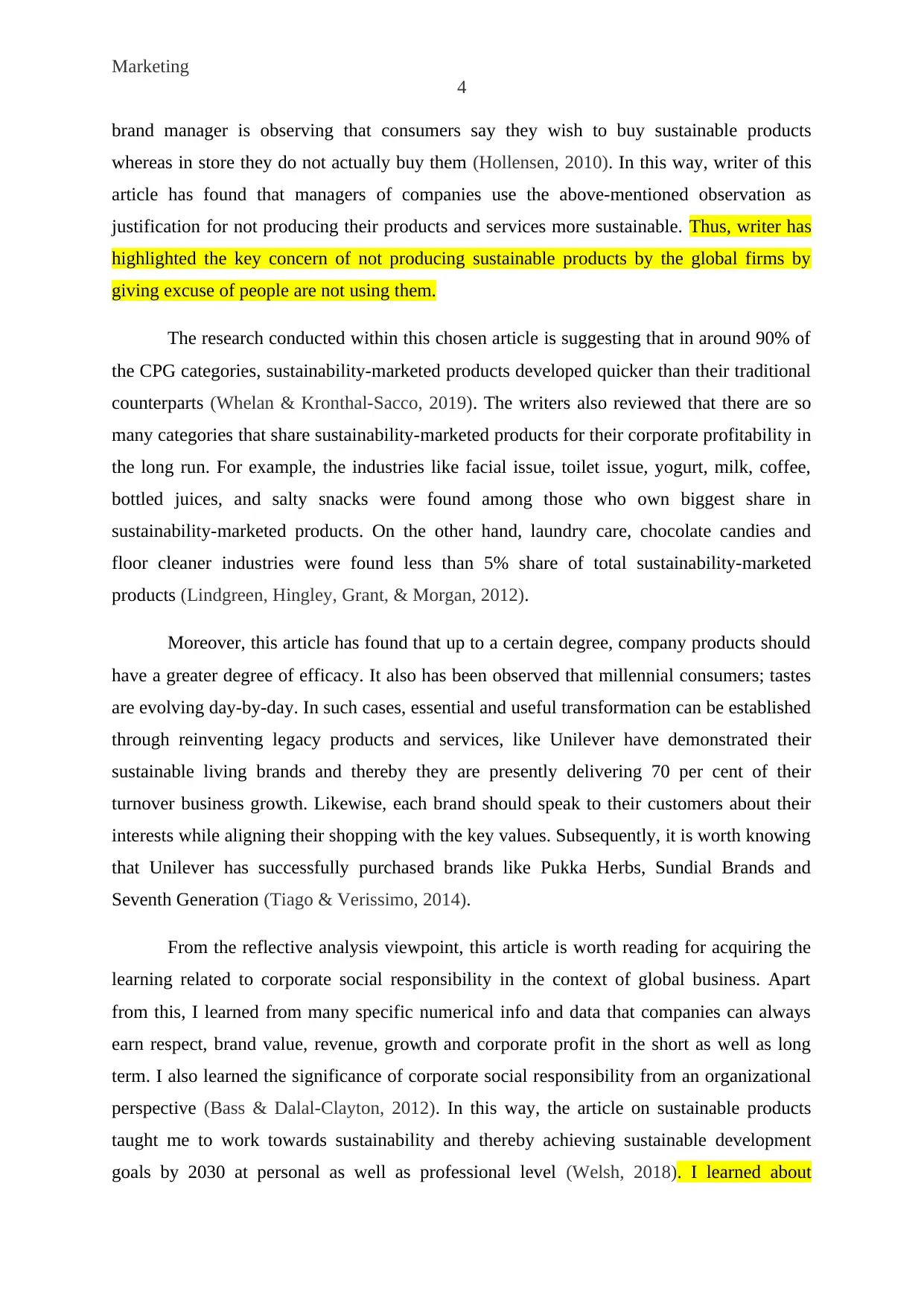
Marketing
4
brand manager is observing that consumers say they wish to buy sustainable products
whereas in store they do not actually buy them (Hollensen, 2010). In this way, writer of this
article has found that managers of companies use the above-mentioned observation as
justification for not producing their products and services more sustainable. Thus, writer has
highlighted the key concern of not producing sustainable products by the global firms by
giving excuse of people are not using them.
The research conducted within this chosen article is suggesting that in around 90% of
the CPG categories, sustainability-marketed products developed quicker than their traditional
counterparts (Whelan & Kronthal-Sacco, 2019). The writers also reviewed that there are so
many categories that share sustainability-marketed products for their corporate profitability in
the long run. For example, the industries like facial issue, toilet issue, yogurt, milk, coffee,
bottled juices, and salty snacks were found among those who own biggest share in
sustainability-marketed products. On the other hand, laundry care, chocolate candies and
floor cleaner industries were found less than 5% share of total sustainability-marketed
products (Lindgreen, Hingley, Grant, & Morgan, 2012).
Moreover, this article has found that up to a certain degree, company products should
have a greater degree of efficacy. It also has been observed that millennial consumers; tastes
are evolving day-by-day. In such cases, essential and useful transformation can be established
through reinventing legacy products and services, like Unilever have demonstrated their
sustainable living brands and thereby they are presently delivering 70 per cent of their
turnover business growth. Likewise, each brand should speak to their customers about their
interests while aligning their shopping with the key values. Subsequently, it is worth knowing
that Unilever has successfully purchased brands like Pukka Herbs, Sundial Brands and
Seventh Generation (Tiago & Verissimo, 2014).
From the reflective analysis viewpoint, this article is worth reading for acquiring the
learning related to corporate social responsibility in the context of global business. Apart
from this, I learned from many specific numerical info and data that companies can always
earn respect, brand value, revenue, growth and corporate profit in the short as well as long
term. I also learned the significance of corporate social responsibility from an organizational
perspective (Bass & Dalal-Clayton, 2012). In this way, the article on sustainable products
taught me to work towards sustainability and thereby achieving sustainable development
goals by 2030 at personal as well as professional level (Welsh, 2018). I learned about
4
brand manager is observing that consumers say they wish to buy sustainable products
whereas in store they do not actually buy them (Hollensen, 2010). In this way, writer of this
article has found that managers of companies use the above-mentioned observation as
justification for not producing their products and services more sustainable. Thus, writer has
highlighted the key concern of not producing sustainable products by the global firms by
giving excuse of people are not using them.
The research conducted within this chosen article is suggesting that in around 90% of
the CPG categories, sustainability-marketed products developed quicker than their traditional
counterparts (Whelan & Kronthal-Sacco, 2019). The writers also reviewed that there are so
many categories that share sustainability-marketed products for their corporate profitability in
the long run. For example, the industries like facial issue, toilet issue, yogurt, milk, coffee,
bottled juices, and salty snacks were found among those who own biggest share in
sustainability-marketed products. On the other hand, laundry care, chocolate candies and
floor cleaner industries were found less than 5% share of total sustainability-marketed
products (Lindgreen, Hingley, Grant, & Morgan, 2012).
Moreover, this article has found that up to a certain degree, company products should
have a greater degree of efficacy. It also has been observed that millennial consumers; tastes
are evolving day-by-day. In such cases, essential and useful transformation can be established
through reinventing legacy products and services, like Unilever have demonstrated their
sustainable living brands and thereby they are presently delivering 70 per cent of their
turnover business growth. Likewise, each brand should speak to their customers about their
interests while aligning their shopping with the key values. Subsequently, it is worth knowing
that Unilever has successfully purchased brands like Pukka Herbs, Sundial Brands and
Seventh Generation (Tiago & Verissimo, 2014).
From the reflective analysis viewpoint, this article is worth reading for acquiring the
learning related to corporate social responsibility in the context of global business. Apart
from this, I learned from many specific numerical info and data that companies can always
earn respect, brand value, revenue, growth and corporate profit in the short as well as long
term. I also learned the significance of corporate social responsibility from an organizational
perspective (Bass & Dalal-Clayton, 2012). In this way, the article on sustainable products
taught me to work towards sustainability and thereby achieving sustainable development
goals by 2030 at personal as well as professional level (Welsh, 2018). I learned about
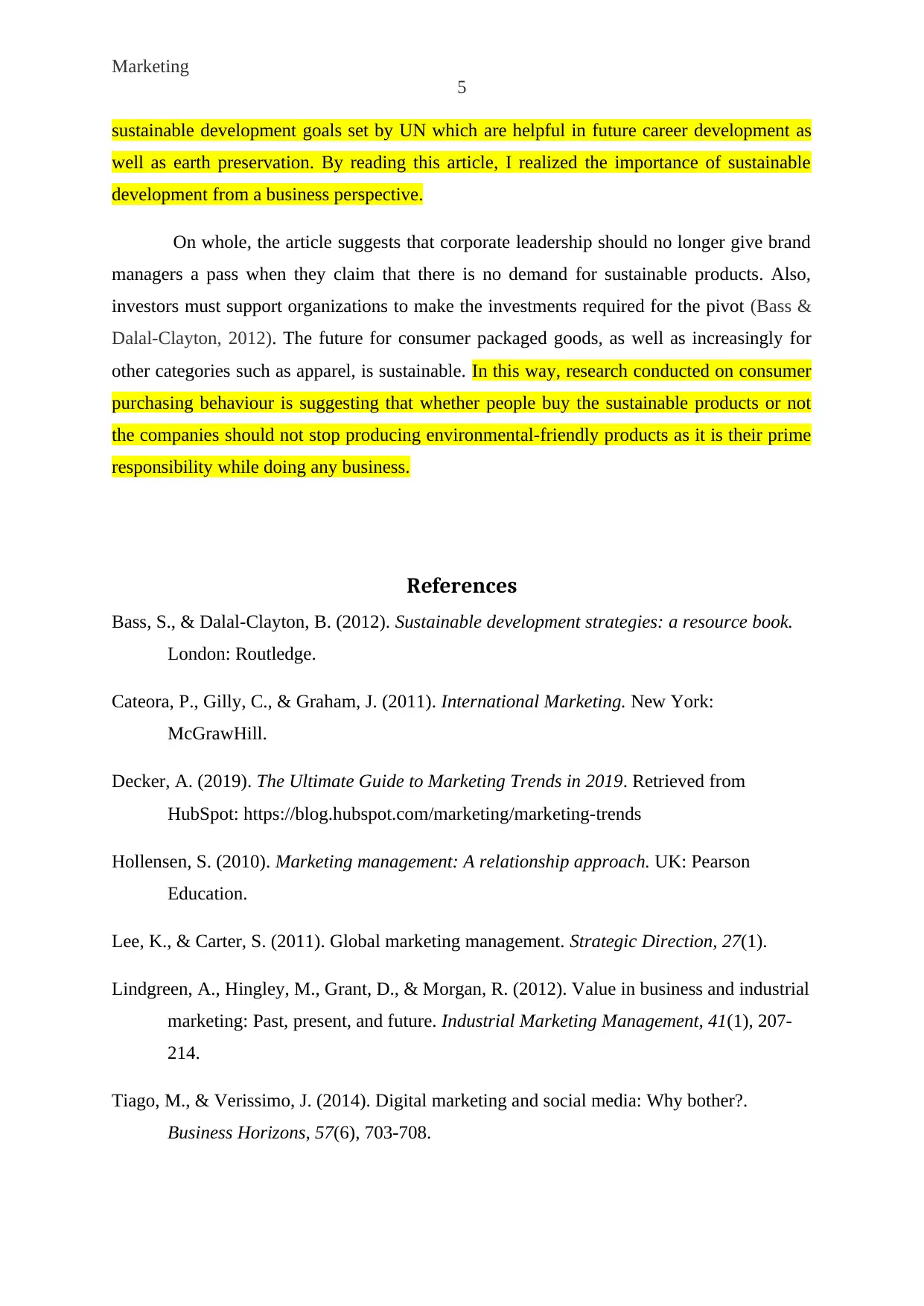
Marketing
5
sustainable development goals set by UN which are helpful in future career development as
well as earth preservation. By reading this article, I realized the importance of sustainable
development from a business perspective.
On whole, the article suggests that corporate leadership should no longer give brand
managers a pass when they claim that there is no demand for sustainable products. Also,
investors must support organizations to make the investments required for the pivot (Bass &
Dalal-Clayton, 2012). The future for consumer packaged goods, as well as increasingly for
other categories such as apparel, is sustainable. In this way, research conducted on consumer
purchasing behaviour is suggesting that whether people buy the sustainable products or not
the companies should not stop producing environmental-friendly products as it is their prime
responsibility while doing any business.
References
Bass, S., & Dalal-Clayton, B. (2012). Sustainable development strategies: a resource book.
London: Routledge.
Cateora, P., Gilly, C., & Graham, J. (2011). International Marketing. New York:
McGrawHill.
Decker, A. (2019). The Ultimate Guide to Marketing Trends in 2019. Retrieved from
HubSpot: https://blog.hubspot.com/marketing/marketing-trends
Hollensen, S. (2010). Marketing management: A relationship approach. UK: Pearson
Education.
Lee, K., & Carter, S. (2011). Global marketing management. Strategic Direction, 27(1).
Lindgreen, A., Hingley, M., Grant, D., & Morgan, R. (2012). Value in business and industrial
marketing: Past, present, and future. Industrial Marketing Management, 41(1), 207-
214.
Tiago, M., & Verissimo, J. (2014). Digital marketing and social media: Why bother?.
Business Horizons, 57(6), 703-708.
5
sustainable development goals set by UN which are helpful in future career development as
well as earth preservation. By reading this article, I realized the importance of sustainable
development from a business perspective.
On whole, the article suggests that corporate leadership should no longer give brand
managers a pass when they claim that there is no demand for sustainable products. Also,
investors must support organizations to make the investments required for the pivot (Bass &
Dalal-Clayton, 2012). The future for consumer packaged goods, as well as increasingly for
other categories such as apparel, is sustainable. In this way, research conducted on consumer
purchasing behaviour is suggesting that whether people buy the sustainable products or not
the companies should not stop producing environmental-friendly products as it is their prime
responsibility while doing any business.
References
Bass, S., & Dalal-Clayton, B. (2012). Sustainable development strategies: a resource book.
London: Routledge.
Cateora, P., Gilly, C., & Graham, J. (2011). International Marketing. New York:
McGrawHill.
Decker, A. (2019). The Ultimate Guide to Marketing Trends in 2019. Retrieved from
HubSpot: https://blog.hubspot.com/marketing/marketing-trends
Hollensen, S. (2010). Marketing management: A relationship approach. UK: Pearson
Education.
Lee, K., & Carter, S. (2011). Global marketing management. Strategic Direction, 27(1).
Lindgreen, A., Hingley, M., Grant, D., & Morgan, R. (2012). Value in business and industrial
marketing: Past, present, and future. Industrial Marketing Management, 41(1), 207-
214.
Tiago, M., & Verissimo, J. (2014). Digital marketing and social media: Why bother?.
Business Horizons, 57(6), 703-708.
⊘ This is a preview!⊘
Do you want full access?
Subscribe today to unlock all pages.

Trusted by 1+ million students worldwide
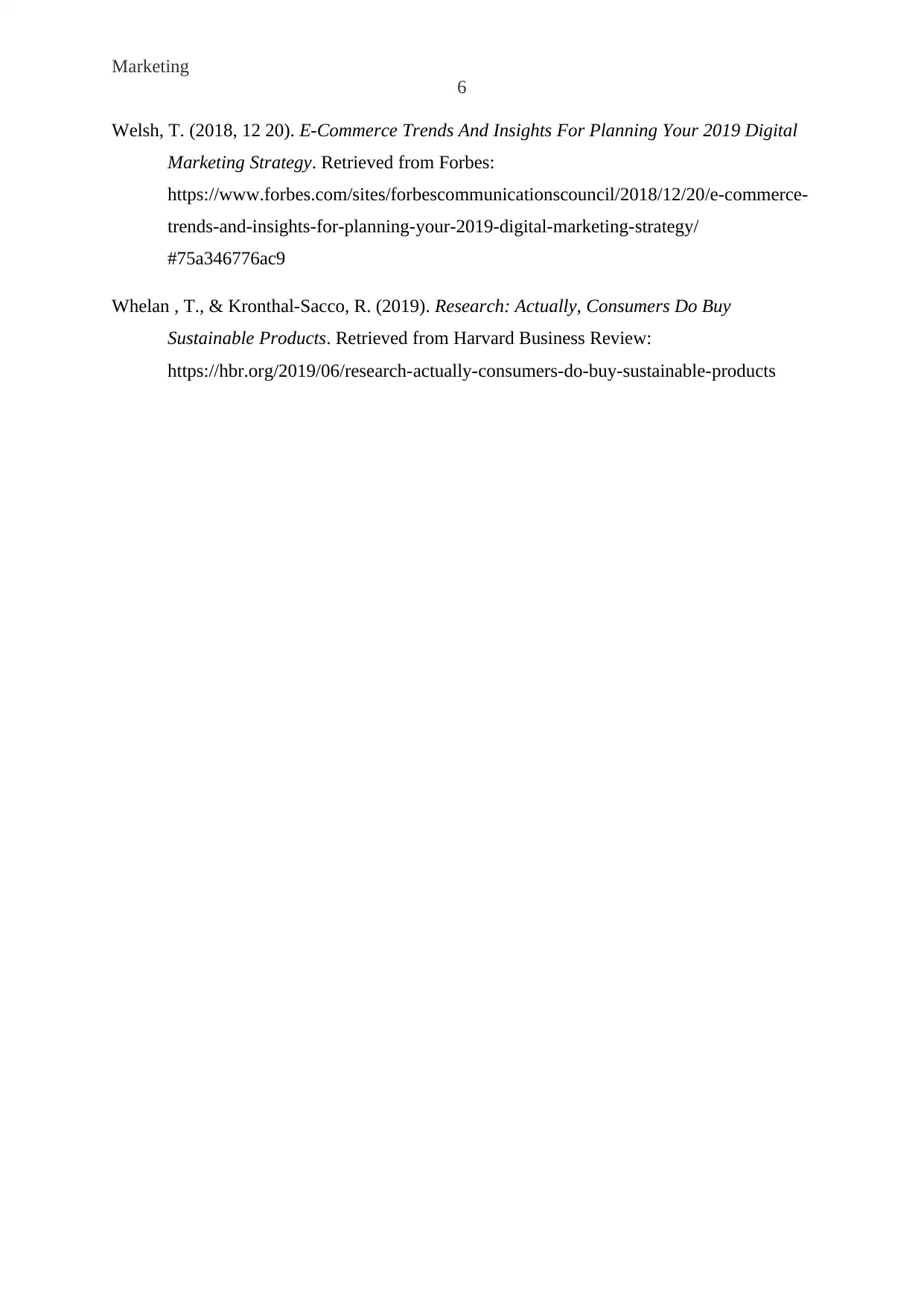
Marketing
6
Welsh, T. (2018, 12 20). E-Commerce Trends And Insights For Planning Your 2019 Digital
Marketing Strategy. Retrieved from Forbes:
https://www.forbes.com/sites/forbescommunicationscouncil/2018/12/20/e-commerce-
trends-and-insights-for-planning-your-2019-digital-marketing-strategy/
#75a346776ac9
Whelan , T., & Kronthal-Sacco, R. (2019). Research: Actually, Consumers Do Buy
Sustainable Products. Retrieved from Harvard Business Review:
https://hbr.org/2019/06/research-actually-consumers-do-buy-sustainable-products
6
Welsh, T. (2018, 12 20). E-Commerce Trends And Insights For Planning Your 2019 Digital
Marketing Strategy. Retrieved from Forbes:
https://www.forbes.com/sites/forbescommunicationscouncil/2018/12/20/e-commerce-
trends-and-insights-for-planning-your-2019-digital-marketing-strategy/
#75a346776ac9
Whelan , T., & Kronthal-Sacco, R. (2019). Research: Actually, Consumers Do Buy
Sustainable Products. Retrieved from Harvard Business Review:
https://hbr.org/2019/06/research-actually-consumers-do-buy-sustainable-products
1 out of 7
Related Documents
Your All-in-One AI-Powered Toolkit for Academic Success.
+13062052269
info@desklib.com
Available 24*7 on WhatsApp / Email
![[object Object]](/_next/static/media/star-bottom.7253800d.svg)
Unlock your academic potential
Copyright © 2020–2025 A2Z Services. All Rights Reserved. Developed and managed by ZUCOL.




